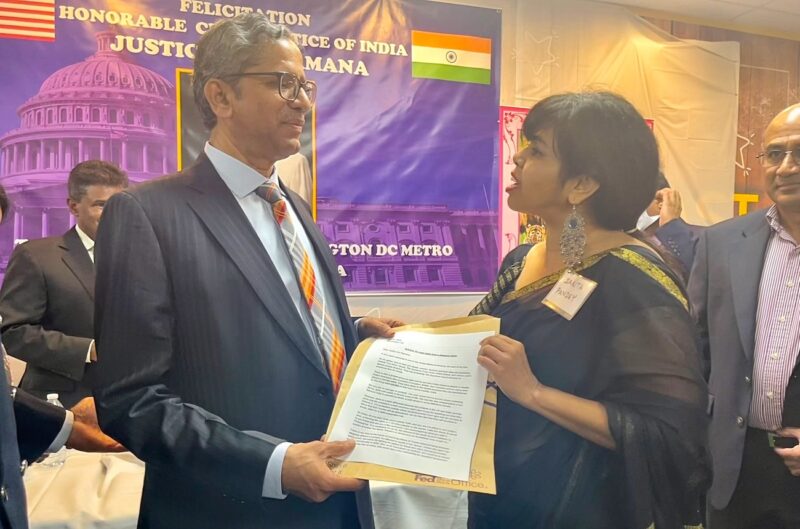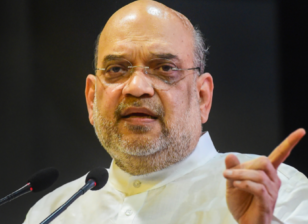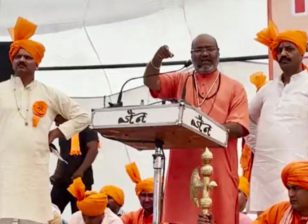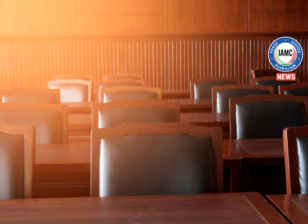In What Discourse Can We Converse With the Heartless: An Open Letter to the Chief Justice of India
Yesterday, on June 26, I got a chance to meet with N.V. Ramana, Chief Justice of the Supreme Court of India, at an informal gathering of Indians in Washington, D.C. There I presented him with an open letter. He accepted it graciously and promised to read it.
Dear Justice N.V. Ramana,
A very warm welcome to you to the United States of America, the land of the free.
As we gather here to hear you speak, women, femmes and their allies are protesting outside the White House, the Supreme Court of the United States, and various public spaces across America. They are protesting the Supreme Court’s decision to overthrow Roe Vs Wade.
There is also a protest going on right now by our own Indian people in Seattle. Last week, there were Indian American protests in Houston, Dallas, San Francisco and many other places. They have taken to the streets because they are disheartened by the rising islamophobia in their home country, India.
But you are no stranger to protests. You and I come from a country where protesting, sit-ins, and fasts-unto-death are almost a way of life. We owe the very independence of our beloved India to peaceful protests, a path shown to us by Mahatma Gandhi.
However, there is a stark difference between the protests in the U.S. and India and the price that the protestors in both countries might have to pay for speaking out about what they believe in. The protesters outside the White House/Supreme Court right now do not have to worry that their houses will be demolished, nor do they fear that they will be jailed or, worse, killed by a state-supported mob.
So, today, as you and I both stand outside India, and you are not sitting in your judge’s seat, protecting the rights of 1.38 billion people on the planet, I take the liberty to speak to you freely and ask you a few questions. I am encouraged by what you said in Philadelphia: “It is necessary for us all, the citizens of the world, to work tirelessly to sustain and further the liberty, freedom & democracy our forefathers have fought for.”
Fresh in my mind is the horror of watching videos of Teesta Setalvad being arrested, allegedly without a warrant, and not allowed to speak to her lawyer. Teesta has spent her entire youth, her entire life fighting for justice for those who were charred physically, socially, and emotionally in 2002. She could have given up anytime, she could have looked the other way like so many; she could have been intimidated by repeated harassment and threats to her, but she never stopped because she is a woman of integrity and conviction.
Teesta’s arrest was followed by the arrest of police officer R.B. Sreekumar, who has been vocal against Prime Minister Modi since long before he was so powerful. Ex-IPS officer Sanjiv Bhatt is already serving a life sentence for killing a man he never met, convicted at a trial where he wasn’t allowed to cross-examine public witnesses or call his own, or even make concluding remarks. It sure would be convenient for those accused of complicity in the 2002 Gujarat carnage that all three of them stay behind bars since most other witnesses have died, disappeared, or have been silenced. Why is the justice system of India so keen to keep the high and mighty holding important offices in good humor?
You must know about Zakia Jafri, who has been fighting for justice for the killing of her husband and dozens of others in their house in 2002. Her plea was dismissed just a couple of days ago. In a double whammy, it was your Supreme Court’s ruling on Zakia Jafri’s plea that led to Teesta’s arbitrary arrest, as the highest court ordered an investigation into those who supported Zakia. Dismayed, Zakia’s son responded that they believe in God, Allah, who will make sure that justice will prevail. They have already waited for 20 years. You said in April this year that in the age of instant noodles, people expect instant justice. It isn’t “instant noodles” they were hoping for; it has been a long, tortuous, humiliating, dangerous 20 years for this unfortunate family. Personally, I am not much of a believer, I don’t expect any Gods from the high heavens to dispense justice. Do you think justice has been served to Zakia Jafri?
Every week in India is a fresh theater of state-sponsored violence. Two weeks ago, the world witnessed young activist Afreen Fatima’s mother’s house being demolished in broad daylight, with a fake backdated order in her father’s name. Dozens of Muslim houses and businesses have been bulldozed in India’s largest state, Uttar Pradesh. Several Muslim protesters were shot dead by the police, some of them twice or thrice, straight on their heads. Families have been destroyed, babies and children who haven’t even begun to speak yet have been pushed into a life of abject poverty that they will never escape. Some people protested on Twitter, and some stories were published in international media, but the Supreme Court has watched it all in silence. Is your silence a nod to the powers to carry on? Isn’t silence complicity?
It couldn’t have escaped your notice that the so-called mainstream media of our home country holds their own trial in their primetime slots, pronouncing judgments with staggering conviction, long before the cases reach your courts. The government’s lapdog newscasters decide who gets to speak, how, and how much. Most of what is spoken on their platforms are the literal definition of hate speech. One of your esteemed colleagues in the Delhi High Court said, “If you’re saying something with a smile then there is no criminality, if you’re saying something offensively then (there is) criminality.” Do you agree with him? While houses of hapless Muslims were being razed to the ground, even as the police chased them away from trying to gather some valuables, one senior journalist jokingly asked British Prime Minister Boris Johnson on Twitter if he was considering setting up a new JCB plant, given the increased demand of bulldozers. Earlier this year, Genocide Watch issued a genocide alert for Indian Muslims. This globally recognized genocide prevention organization is led by Dr. Gregory Stanton who predicted the Rwandan genocide; he has raised alarm for India at least twice before. Is it okay to call for and enable genocide, if done with a smile?
Nargis Saifi is a mother of three young children, the wife of Khalid Saifi who’s an activist and your everyday Muslim businessman incarcerated on bogus charges that haven’t even been examined yet. She says her daughter asks why can’t she meet her father, and why does the police drag him when she sees her. Khalid has been in jail for over two years. His daughter, Maryam, was six when he was arrested. Nargis has always been a housewife; her husband’s small business is now shut. They struggle for basic needs. Khalid is tortured in jail. What do you think Nargis should tell Maryam? Did you get a chance to read his case, just out of curiosity? Can you assure little Maryam that her father will get justice?
Have you heard of Umar Khalid — the bright young activist, always with a smile on his face and books in his hands? He has been in jail for almost two years based on a doctored video. The video was falsified by a media giant. If you watched that video, you’d be proud of him, for he was lauding the document he considers sacred, the Constitution of India, the same document you and your colleagues refer to while discharging your duty. But Umar is in jail, smiling, reading, waiting for justice. You have been a student activist yourself in your time, probably you can relate to his motivations, his energy, and his ability to stay positive. Do you think he stands a chance? Will it be equivalent to demanding instant noodles if I were to beseech you to grant him bail, at least?
You may not be aware, since you are on a summer break and traveling for leisure – as is your right – that even as we gather here to talk about democracy and justice, Gautam Navlakha, Rona Wilson, Varavara Rao, Anand Teltumbde, G.N. Saibaba, Sudhir Dhave, Shoma Sen, Hany Babu, and so many names that will fill several pages, are still in jail? The world calls them “prisoners of conscience.” They have been in jail based on evidence proven to be planted on their computers through sophisticated spyware. Father Stan Swamy, a Jesuit priest, denied a straw so he could sip some nourishment into his Parkinson’s-ravaged body, died in jail last July. The world hung its head in shame for failing to secure the dignity of justice for him.
Growing up, I thought only autocratic regimes like China, Russia, etc., held prisoners of conscience and felt grateful to be born in India. For what can freedom mean without the freedom to dissent, the freedom to point fingers at powerful people and institutions? Currently, the United States Commission on International Religious Freedom (USCIRF) recognizes 44 Indians as prisoners of conscience. Do you think others should be prepared to meet the same fate as Father Stan? Would the Supreme Court right these wrongs?
You started your career as a journalist. Does it bother you that in the 2022 World Freedom Index, Reporters Without Border (RSF) recently has downgraded India to the 150th position among 170 countries? Or that, since 2014, 22 journalists have been jailed, seven of them in 2021 alone? Shockingly, or perhaps not, 22 journalists have been killed since 2014 in India. These are not famous people from big corporate media houses. These are (or were, because one too many were killed) reporters and stringers, barely able to make enough to survive while practicing their trade. Asif Sultan, Gulfisha Fatima, Fahad Shah, Siddique Kappan, Sajad Gul, Sharjil Imam, yet another string of names, just names, only making headlines for being jailed, for making “anti-India” stories.
When you were a journalist, weren’t you, too, trained to follow the time-honored purpose of journalism: comfort the afflicted, afflict the comfortable? Would you advise a journalist, should she get an opportunity to interview the Prime Minister of the largest democracy in the world, to ask him about their favorite fruit or energy drink, or would you encourage her to ask the big man what exactly happened in Gujarat from Feb to March 2002?
Last week, the Karnataka High Court, in a shocking judgment, virtually nullified the Scheduled Castes and the Scheduled Tribes (Prevention of Atrocities) Act, ruling that any casteist abuse must happen in a public space to be considered a crime under the law. Given the strong grip of caste discrimination among privileged Hindus, when Dalits are killed for riding a horse or drinking water from wells designated for ‘upper-caste’ people, or worse, falling in love with an ‘upper-caste’ person, do you think we are ready to do away with SC-ST Act? Do you think Dalit lives matter?
Do the lives of Indian minorities matter? As you answer this, I urge you to think of young Junaid killed on a train, baby Asifa raped and killed in a temple, Akhlaq stabbed to death on the false allegation of cow slaughter, Pehlu Khan killed in front of his son, Tabrez forced to chant Jai Shri Ram by a cheering mob as they beat him to death, Mohammad Saleem (55), Mohammad Khaleel, Alam (35), Sameer Shahpur (19), Musharraf (35), Babbu (30), Mehtab (22), Zakir Saifi (28), Aqib (19), all killed by Hindu terrorists with no consequences.
Indian Christians have been mocked as rice bag converts for a long time. But now with anti-conversion law in place, their persecution has been legalized. On Christmas day six months ago, as Christians in India dressed in all their finery went to the church, they were attacked by Hindu terrorists at several places in India. I am sure you saw the haunting image of the broken statue of Jesus Christ outside a church in Gurgaon and were repulsed by videos of effigies of Santa Claus being burnt. Pastors in India can be attacked anywhere, anytime with complete impunity. Do you believe in religious freedom for Christians, or do you believe in ‘ghar-vapasi’?
Is India a Hindu Rashtra already? Encouraged by the judgment on Babri Masjid demolition, defacing and destroying mosques/dargahs/shrines to place Hindu idols has become commonplace. Gyanvapi Mosque, built 350 years ago by Mughal emperor Aurangzeb, is now partially sealed as directed by the Supreme Court. Qutub Minar, Taj Mahal, fascinating architectural marvels might now be dug up or converted into temples. Do you see and condone this genocide?
Your Supreme Court refused to hear against Karnataka High Court’s verdict that prevents hijab-wearing girls from attending school. As Chief Justice of India, what is your message to these hijabi students?
I earnestly ask you, should I believe in the judiciary of India?
Finally, do you also wonder, like Najeeb’s mother does, where Najeeb is? Or, who killed Judge Loya? Or, are these inconsequential questions?
Didn’t Varavara Rao, too, ask a trivial question:
In what discourse
Can we converse
With the heartless?
Sincerely,
Sarita Pande
A Concerned NRI
Jun 26, 2022
Washington, D.C.
This article first appeared in American Kahani




